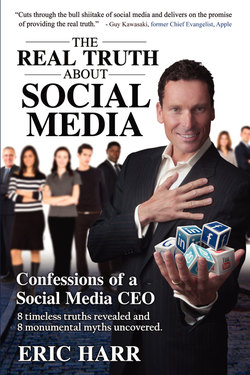Читать книгу The REAL TRUTH About Social Media - FastPencil Premiere - Страница 7
На сайте Литреса книга снята с продажи.
Twitter is a micro-blogging platform that allows you to set up your own page and start tweeting—or posting content—in minutes. Those tweets automatically go out to people who choose to follow you (they need to be registered for the service, too), but people can also search for your page (even if they’re not registered) and read everything you’ve ever tweeted. Here’s the fun part: Tweets are limited to 140 characters. Not words…characters! Communicating this way may sound challenging, but it is what makes Twitter so appealing. You don’t have to wade through wordy diatribes and manifestos (like, say, this book!). Theoretically, you must say more with less—be quick and pithy. William Shakespeare, Thomas Jefferson and Robert Southey probably would have approved:
Shakespeare (from Hamlet): “Therefore, since brevity is the soul of wit, And tediousness the limbs and outward flourishes, I will be brief.”
Jefferson: “The most valuable of all talents is that of never using two words when one will do.”
Southey: “It is with words as with sunbeams. The more they are condensed, the deeper they burn.”
Twitter benefits you in two ways: You can share and learn in one place. For example, I currently follow my wife, CARE, CNN, The Economist, the UN Refugee Agency and the Tour de France (it’s July and what a Tour!). I get all of the updates and news from the people and organizations I care about in concise, authentic vignettes—all on my page, as they happen.
Serial entrepreneur Jack Dorsey hatched the idea for Twitter in March 2006, and it took flight that July.
According to The New York Times,
Twitter was born in 2006 as a side project. At the time, it was an appendage of a podcasting service named Odeo, another company that Mr. Williams co-founded that had millions of dollars from investors.
Work on the project started on March 21, 2006, when Dorsey published the first Twitter message at 9:50 p.m. Pacific Standard Time: “just setting up my twttr.”
Those five words cracked the ocean floor and triggered a tsunami.
In an interview with the Los Angeles Times, Dorsey said: “…we came across the word ‘twitter,’ and it was just perfect. The definition was ‘a short burst of inconsequential information,’ and ‘chirps from birds.’ And that’s exactly what the product was.”
It’s a creative and clever name, but it carries a negative stigma for being irrelevant and insipid. Although a lot of it can be a mind-numbing exercise in too much information (even in 140 characters or less—it only takes 28 to say “I’m out of toilet paper again,” for instance!), a big enough part of Twitter speeds communication, tips brands, and changes the world. It’s like a trade show: Much of it is ego-stroking and back-slapping, but pockets of it are productive.
Twitter’s growth is eye-popping: 200 million users now churn out roughly 350 million tweets every day. The website fields over 1.6 billion search queries per day. If you want to know what’s happening at this moment about virtually anything, visit search.twitter.com and enter the topic. When a tsunami struck the coast of Japan, more people followed the news on Twitter than on TV, where coverage lagged. When it comes to real-time news, the little blue bird flies circles around search engine behemoth Google—or any mainstream media for that matter.
